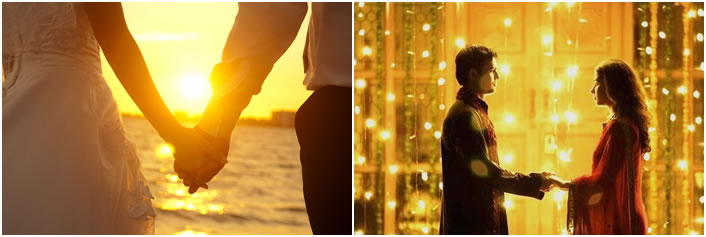Weddings
(Early Music, Baroque, Classical, Romantic, 20th C & Contemporary, New Age)
Religious/Sacred |
| |
| The Call |
|
| A gem of a song written by R. Vaughan Williams. It is no. 4 from his collection called
‘5 Mystical Songs’. The beautiful words are by George Herbert, a priest who wrote poetry in private.
On his deathbed he gave the poems to a friend saying “Publish them if you think they might turn to the advantage any poor soul,
otherwise burn them”. |
| |
Ave Maria: *
(Bach/Gounod, Schubert and Caccini)
(Mascagni's Sancta Maria also known as Intermezzo is not recorded yet) |
View on YouTube
click here »
for Bach/Gounod's Ave Maria
click here »
for Schubert's Ave Maria with piano accompaniment
click here »
for Schubert's Ave Maria with harp accompaniment
click here »
for version attributed to Caccini/Vavilov |
| Three versions of the Marian Antiphon often sung at weddings and funerals. Perhaps one of the best-known Classical
Songs, apart maybe from the so-called Caccini Version. No one knows for sure who wrote it. They are all timeless prayers to Mother
Mary. |
| |
The Lord Bless You and keep You
By John Rutter:
|
|
| ‘The Lord bless you and keep you’ is a setting of the Priestly Blessing, also known as the Aaronic blessing,
from the Book of Numbers in the Bible. Rutter has set it in 3 different arrangements - I sing the soprano part in his SA version. This part is very similar
to the soprano part in his more well-known choir version, which was sung at the 100th birthday of the Queen Elizabeth, The Queen Mother in 2000.
|
| |
| Beata Viscera: * |
View on YouTube click here » |
A divine processional Marian hymn which couldn't have been composed before year 1220 by ‘Perotin’ also
known as ‘Perotin Magister’ or ‘Perotin the Great’.
The words are by Phillip de Chancellor a French Theologian and Latin Medieval Lyric Poet.
‘The King of illustrious name, concealing in another guise the power of his divinity, has sealed a pact between God and
Man’. ‘O Wondrous Novelty!’. |
| |
| How Beautiful are the Feet * |
View on YouTube click here » |
From G F Handel's beloved oratorio ‘Messiah’. Charles Jennens wrote the libretto for it, inspired by the Biblical text from the Old Testament.
The music for Messiah was completed in 24 days of swift composition. The effort of writing so much music in so short a time was not unusual for Handel and his contemporaries;
Handel commenced his next oratorio, Samson, within a week of finishing Messiah.
Three different settings of this sublime aria are all in print. His many attempts to set ‘How Beautiful are the Feet’ point to
Handel's continuing dissatisfaction and his determination to find something better. |
| |
| Panis Angelicus (Bread of the Angels): |
|
| Any journey through Cesar Franck's music is deeply rewarding. And yet, he is far and away remembered
for this one piece of music, Panis Angelicus, which has been recorded hundreds of times and is still performed
frequently the world over. |
| |
Lauda V - Altissima Luce
(Most Exalted Light) * |
View on YouTube
click here »
Lauda V - Slide show on Youtube
click here »
Lauda V - in High Definition Live Video
|
Gavin Bryars Laude' are based in spirit and feeling on a collection of unaccompanied Laude found in 13th C Cortona.
The Latin texts are mostly Maryan, yet they were not associated with any church or liturgy.
Gavin Bryars' Lauda V is written in 2002
and ancient chant somehow emerges as engagingly contemporary.
About his Laude he says, “I relish the challenge of writing
something so exposed, so naked and unadorned, where I cannot hide behind, say, a skilfully orchestrated accompaniment.
Like a painter
who has hitherto had the luxury of painting massive canvases with dense oils, being obliged to work in pen and ink, in black and white,
on a simple piece of paper”. |
Wedding Songs
Secular |
| |
| Bist Du Bei Mir (Be Thou with Me): * |
View on YouTube click here » |
| Composed by Gottfried H. Stölzel, used by Johann Sebastian Bach in his piano book for his second wife Anna
Magdalena Bach. An aria with a hauntingly beautiful melody made grippingly memorable by the poem's directly spoken words. This
piece has become very popular for special celebrations & ceremonies, both for weddings and funerals alike. It was featured
in the French film ‘Joyeux Noel’ |
| |
| Where'er you Walk: |
|
| From G. F. Handel's oratorio/opera ‘Semele’, HMW 58. ‘Semele’ is based on
a classical legend, drawn from Ovid's ‘Metamorphoses‘, retold in a libretto by William Congreve. This aria is sung by the
god ‘Jupiter’ as he conjures up ‘Arcadia’, a pastoral paradise, as part of his wooing of the beautiful Semele. |
| |
| ‘Morgen’ (Tomorrow): * |
View on YouTube click here » |
| By Richard Strauss (1864-1949), with words by John Henry Mackay. This unique song is one of the three glorious
songs that Strauss presented to his beloved Pauline (a distinguished singer) on their wedding day in 1894. ‘Let heaven unite
a love that earth no more shall sunder‘. |
| |
Amarilli mia Bella:
(Amaryllis, my beautiful one) |
|
| A wonderful lovesong by Giulio Caccini (1545-1618). ‘Open my breast and you will see
written on my heart: Amaryllis is my love.’ |
| |
| Jeg Elsker Dig (I Love You): |
|
| This song is the most famous of Grieg's(1843-1907) songs. It is one of a group of four settings
of poems in Danish by Hans Christian Andersen. The song was composed at the end of 1864 when Grieg became engaged
to his cousin Nina Hagerup, a well-known singer. |
| |
| You raise me Up |
|
| ‘You Raise Me Up’ is a song originally composed by Irish-Norwegian duo Secret Garden.
The song has been recorded by more than a hundred other artists including Josh Groban, who popularized the song in 2003;
his rendition became a hit in the United States. The Irish band Westlife then popularized the song in the UK two years later.
I sing Celtic Woman's version of this song. |
Wedding Songs - Folk Style
Religious/Sacred |
| |
| May the Road Rise up to Meet You: |
|
| This is a world-famous Irish blessing, which the wonderful composer Bob Chilcott has used for his composition. |
Wedding Songs - Folk Style
Secular |
| |
| My Love is like a Red, Red Rose: * |
View on YouTube click here » |
| This song was composed by Robert Burns (1759-1796) 2 years before he died. It is based on
traditional sources and has been inspiration for many composers, e.g. Alexander L'Estrange who has arranged it. |
| |
| Furrem be me heen / Mary Mack: * |
View on YouTube click here » |
Two wonderful wedding songs that also work together as a part song.
‘Furrem be me heen’ is Gaelic
Mouth Music, port abeul, which is sung music for dancing, when no instruments are available.
‘Mary Mack’ is a
Scottish tongue-twister from Glasgow. |
| |
| She moved through the Fair: * |
View on YouTube click here » |
| A very famous Irish folk song, recorded by many singers, Classical - as well as Folk singers. The words are
re-written by Padraic Colum, the author of the famous children's book ‘The King of Ireland's Son‘.
He seems to have reworked the words of an old Ballad and put them to an ancient Donegal air. |
| |
| The First Time ever I saw your Face: |
|
Unknown to many people, this song originally belonged to the folk song genre, written in 1957 by British political singer/songwriter
Ewan MacColl for Peggy Seeger, who was later to become his wife.
Ewan MacColl himself made no secret of the fact that he disliked all of the cover versions of the song.
He hated all of them, called them 'The Chamber of Horrors.'
The song was popularized by Roberta Flack in 1972 in a version that became a breakout hit for the singer.
This slower, more sensual version was used by Clint Eastwood in his 1971 directorial debut play 'Misty for Me'.
In later years the song has been associated with Leona Lewis and other pop stars.
In June 2013, Peter Jöbeck sang his rendition of this song for the marriage of the Swedish Princess Madeleine
to Mr. Christopher O'Neill in a ceremony at the Palace Chapel in Stockholm. |
| |
| Black is the Colour: |
|
| An old folk song first known in the Appalacian Mountains, but most probably originated from Scotland. Versions
of this song have been recorded by many famous singers, both within Folk and Jazz. |
| |
| Searching for Lambs: |
|
| A widely known Somerset Folk Song which Vaughan Williams has arranged for violin and voice.
A stunning arrangement. This is one of the few folk songs with a happy ending. |
| |
| My Lagan Love: |
|
| This beautiful Irish Folk Song is also very famous. The tune is from Ulster and the words are early
20th C by Joseph Campbell (Seosamh MacCathmhaoil). |
| |
| Dacw Nghariad (There is my Love) * |
View on YouTube click here » |
| A very beautiful Welsh Love Folk Song collected in 1908 in Whitchurch, Cardiff by Mrs. Mary Davies. |


